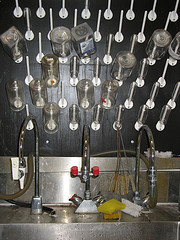The dish on career choices
Posted by Eva Amsen, on 26 May 2010
When we did a survey among attendees of the British Society for Development Biology meeting in April, we asked what topics you would like to discuss on the Node. One of the top answers was careers, so we’ll be sure to include posts about opportunities in developmental biology, and we hope you’ll join us to share some of your stories and tips, or let us know if your lab is hiring.
To start you off, here is an uplifting story about an unconventional entry into a developmental biology career.
 Earlier this month, the Carnegie Institution for Science in Baltimore awarded one of their staff members, Dianne Williams, with the Carnegie Service to Science Award. Dianne joined the institute in 1983, not as a research student, but as a lab dishwasher as part of a work program for inner city youth. She then started preparing fly food for Allan Spradling’s lab, and learned about Drosophila maintenance and molecular biology. While working during the day, she attended Johns Hopkins University at night and eventually earned her MSc degree, publishing her graduate work in a first-author paper in PNAS. After that, she continued to work as a technician in the Spradling lab, and produced an antibody against the germline protein Vasa that is currently used by researchers around the world.
Earlier this month, the Carnegie Institution for Science in Baltimore awarded one of their staff members, Dianne Williams, with the Carnegie Service to Science Award. Dianne joined the institute in 1983, not as a research student, but as a lab dishwasher as part of a work program for inner city youth. She then started preparing fly food for Allan Spradling’s lab, and learned about Drosophila maintenance and molecular biology. While working during the day, she attended Johns Hopkins University at night and eventually earned her MSc degree, publishing her graduate work in a first-author paper in PNAS. After that, she continued to work as a technician in the Spradling lab, and produced an antibody against the germline protein Vasa that is currently used by researchers around the world.
It’s certainly not the most straightforward route to a career in the lab, and Dianne must have put a lot of effort and energy into studying biology at night after already working in a lab all day. But it does show that there is more than one way to the bench.
How did you end up in biology? And what do you hope to do next?


 (4 votes)
(4 votes)